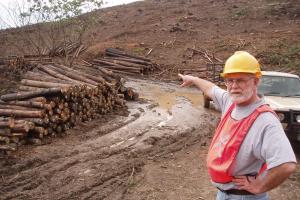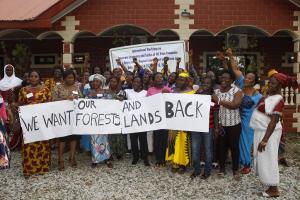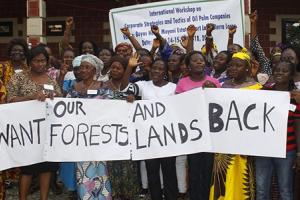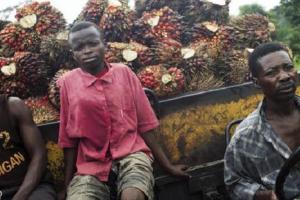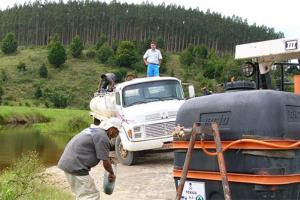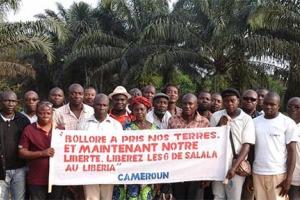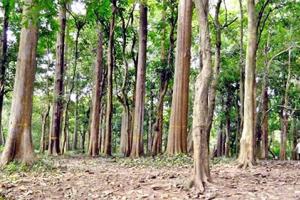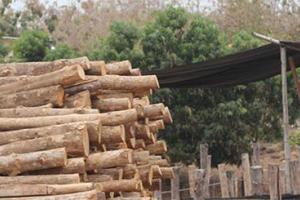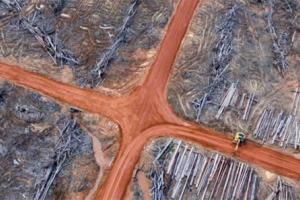The commercial power of the oil palm industry in Indonesia is intertwined with politicians and government authorities at the highest level, which leads to violent grabbing of land from peasant and traditional communities. This article, part of the series “Indonesia for sale”, is the story of money, politics and power in Seruyan, Borneo, Indonesia, one of the main focal areas of the oil palm industry in the country.
Access the article in English here.
Large-Scale Tree Plantations
Industrial tree plantations are large-scale, intensively managed, even-aged monocultures, involving vast areas of fertile land under the control of plantation companies. Management of plantations involves the use of huge amounts of water as well as agrochemicals—which harm humans, and plants and animals in the plantations and surrounding areas.
Action alerts
6 November 2017
Available only in English and Spanish
Other information
30 October 2017
As WRM team, we are shocked and sad with the news that Wally Menne passed away, given the force and energy with which Wally always contaminated us, given his friendship, attention with us and other friend-activists.
25 October 2017
On occasion of September 21st, International day of Struggle against Tree Plantations, women from several countries from West and Central Africa have taken the initiative to release simultaneously the petition we enclose below.
The petition is an urgent request from women in Africa to stop the suffering and the violent impacts the expansion of industrial oil palm plantations is creating on womens´ lives, that affect women in and outside the African continent: Violence, sexual abuses, rape, harassment, persecution, destruction of their means of livelihoods.
Multimedia
28 September 2017
By Global Justice Ecology and Project and Stop GE Trees
Bulletin articles
25 September 2017
Large-scale monoculture plantations “rob women of everything they have as they take the agricultural lands and forests that women depend upon for their livelihoods and for feeding their families”. This is part of the final declaration of a workshop organized in Port Loko, Sierra Leona, in August 2017, which brought together women from Sierra Leona’s Northern, Southern and Eastern regions, together with representatives from Cameroon, Liberia and Guinee. (1)
Bulletin articles
21 September 2017
Oil palm plantations managed by the Canadian-based agribusiness company FERONIA Inc have been opposed by local residents ever since they were established by the previous owner of the plantations, multinational food company Unilever. Incidents of violent abuse and conflict arising from the company’s oil palm plantations in the Democratic Republic of the Congo (DRC) have been a regular occurrence. In 2015, seven children were left orphaned after police killed both indigenous pygmy parents for taking some oil palm fruits from the plantations to feed their children.
Bulletin articles
21 September 2017
The process of territorial transformation in the southernmost part of Bahia is closely intertwined with agriculture in Brazil, and is based on an extremely unequal territorial structure that has been in place since colonial times. But this has recently been exacerbated by the imposition of a single model of extensive and intensive production, using land, water, agrochemicals, chemical inputs, large machinery and biotechnology. This is agribusiness in general, and in particular, the eucalyptus plantations that supply huge pulp mills.
Bulletin articles
21 September 2017
Photo: SOCFIN
Bulletin articles
21 September 2017
Forests? Or Plantations?
Bulletin articles
21 September 2017
Teak plantations in Ecuador are not intended for domestic consumption. All of the teak is exported. There are very few economic benefits for the areas where teak is produced, due to the small amount of labour it requires, producers' non-existent social investment, and the loss of food sovereignty and water scarcity that this industry causes.
Bulletin articles
21 September 2017
For over 20 year now, certification schemes such as the Forest Stewardship Council (FSC) and the Roundtable on Sustainable Palm Oil (RSPO) (1) have helped plantation companies secure their profits and protect their reputation. How do they do that, when the impacts of large-scale industrial eucalyptus, pine, acacia and oil palm plantations are so obvious for all to see?


